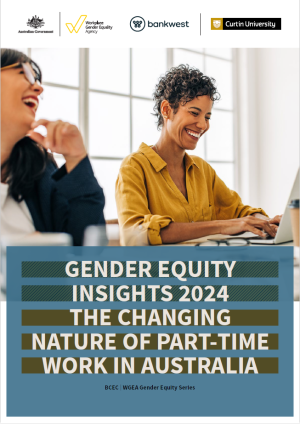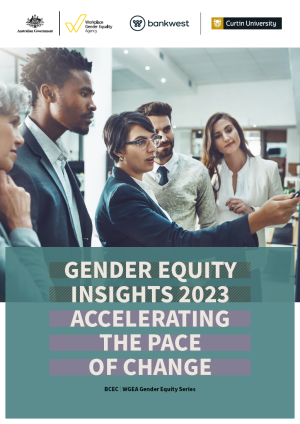Gender Equity Insights 2023: Accelerating the pace of change
The eighth report in the Gender Equity Insights series from the Bankwest Curtin Economics Centre (BCEC) and the Workplace Gender Equality Agency (WGEA) looks at the gender equality strategies at nearly 4,800 Australian employers to determine what factors are accelerating change and closing gender pay gaps.
Using data reported to WGEA in 2019 and 2022, the report indicates employers that have taken deliberate, long-term action in their workplaces get results, finding the best performing Australian companies recorded a 5.3pp drop in their gender pay gaps in three years.
However, the analysis also exposes a deep divide within industry sectors between the best performing businesses – those that are making progress to close their gender pay gaps – and the worst performers. Mining, manufacturing and retail trade as well as the professional, scientific and technical services sector are among the industry sectors where this difference is most pronounced.
The new report compares the policies and actions of companies that are advanced in their approach to gender equality against those that are early in their journey, to develop a new roadmap to inform employer action. The analysis benchmarks the performance of organisations based on their approach to pay equity strategies, recruitment and retention and other policies and actions aimed at driving progress, such as parental leave, family and caregiving, and sex-based harassment.
Key findings:
- The leading 25 per cent of businesses for improved gender pay equity reduced gender pay gaps within their organisations by at least 5.3pp over three years.
- 28 per cent of businesses improved their approach to gender equity over the past three years by raising their maturity by at least one level.
- The best quarter of businesses for increasing the percentage of female workers lifted the share of women in their workforces by 2.5pp in three years.
- While progress has been made, women continue to be under-represented among the top 20 per cent of earners in most industry sectors.
- Around 50 per cent of businesses analysed in this dataset conducted a pay gap analysis in the past year but only one-tenth report pay equity metrics to Executives and Boards.
- The median improvement in the gender pay gap more than doubles over three years for businesses that undertake a gender pay gap audit.
- The share of female manager resignations rose by 2.6pp for businesses at base maturity but reduced by 0.3pp among businesses with highest maturity.
- The share of female board members increased by 3.3pp in three years for businesses that improved their gender equity maturity by at least one level.






